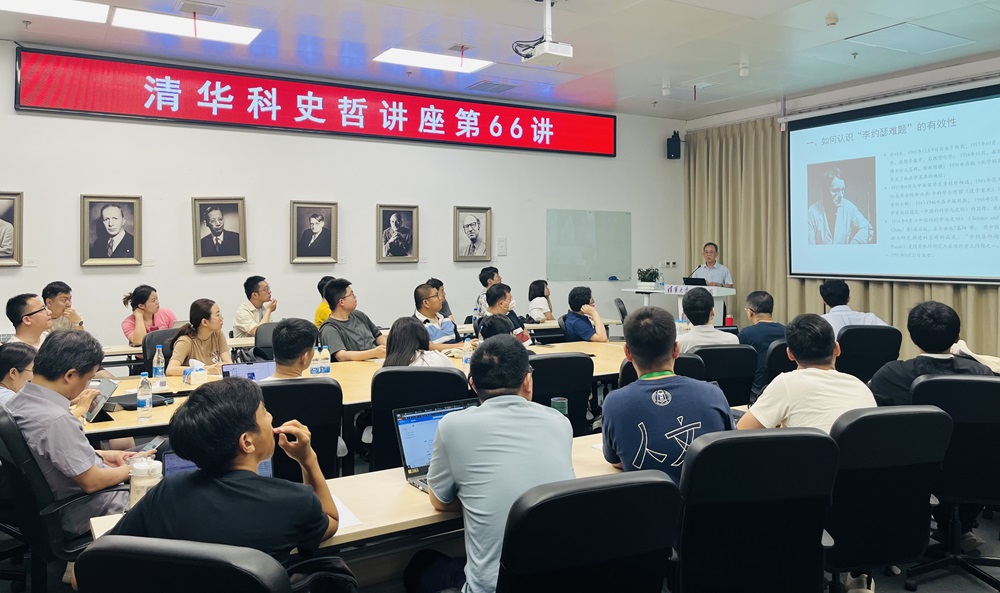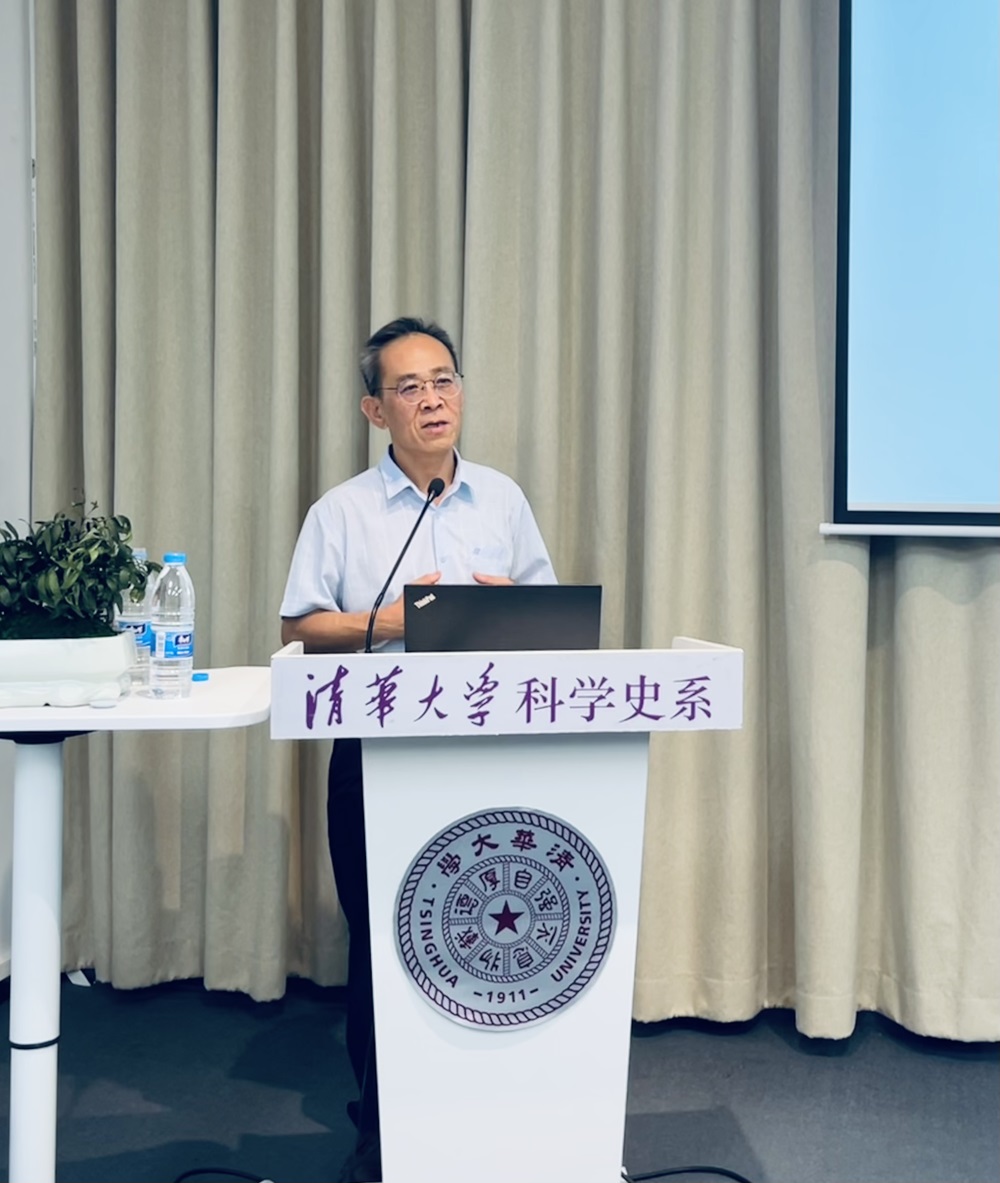On the afternoon of June 13, 2024, the Department of the History of Science at Tsinghua University hosted the 66th Lecture THU History and Philosophy of Science Lecture Series. The guest speaker was Professor Zhang Xushan from the Department of History at Tsinghua University, whose lecture focused on re-examining the "Needham Question." The event was chaired by Associate Professor Jiang Han of the Department of the History of Science, with over thirty faculty members and students attending in person.

At the beginning of the lecture, Professor Jiang Han introduced Professor Zhang’s academic background. Professor Zhang Xushan is currently a professor in the Department of History at Tsinghua University, a member of the Tsinghua University Academic Degree Committee (Humanities), an academic committee member of the Hellenic Research Center at Peking University, and an adjunct professor at the Eastern Europe-Byzantine Research Center of Nankai University. From 1991 to 1998, Professor Zhang studied in Greece, the birthplace of Western science, at Aristotle University of Thessaloniki and the University of Ioannina, earning his Ph.D. in 1998. In 2007, he was selected for the Ministry of Education’s "New Century Excellent Talents Support Program," and in 2024, he was awarded the title of "Senior Translator" by the Translators Association of China. His research spans medieval European history, Byzantine history, and Sino-Western cultural exchange.
Professor Zhang began by explicating the "Needham Question," classically formulated as: "Between the 1st century BCE and the 15th century CE, Chinese civilization was far more effective than Western civilization in applying human natural knowledge to practical needs. Why, then, did modern science emerge in Europe rather than China?" Professor Zhang argued that the Needham Question suffers from three key inadequacies.
First, the comparison of civilizational achievements between East and West from the 1st to 15th centuries is problematic. The rise of modern Western science was not premised on the achievements of this period. Professor Zhang presented evidence showing that modern science originated from the intellectual foundations laid by ancient Greek scholarship (6th–2nd centuries BCE). The legacy of Greek civilization during the Axial Age was a necessary condition for the emergence of modern science. Thus, using the 1st–15th centuries as the comparative timeframe constitutes a "chronological misplacement" irrelevant to the Needham Question.
Second, how should we characterize Chinese civilization during the 1st–15th centuries? Professor Zhang concluded that Chinese achievements during this period were primarily in agriculture, medicine, military strategy, and calendrical calculations—fields dominated by technological inventions rather than systematic scientific inquiry. Ancient Chinese thinkers emphasized practical applications over universal principles, and their philosophical focus was on ethics and human relationships rather than metaphysics or logic.
Third, can a "negative" historical question—why something did not happen—be a valid subject of historical research? Historical study concerns actual past events. The rise of modern science in Europe was a unique historical occurrence, while the absence of independent scientific development in other civilizations, including China, represents a universal phenomenon. Asking why China "failed" to develop modern science invites endless speculative answers but lacks a definitive solution. Professor Zhang proposed shifting the focus to why modern science emerged in Europe, a concrete historical fact with identifiable conditions.

In the latter part of the lecture, Professor Zhang analyzed the conditions for the rise of modern Western science. He highlighted two defining features: the use of mathematical language to formulate hypotheses and experimental verification. These were rooted in the formal logical systems of ancient Greek philosophy (exemplified by Euclidean geometry) and the Renaissance emphasis on experimental causality. He also emphasized the overlooked influence of Scholasticism, which combined Christian theology with rational inquiry. The belief in a divinely ordered universe, inherited from Scholasticism, underpinned the scientific pursuit of natural laws. Early modern scientists like Descartes, Galileo, and Newton were deeply influenced by Scholastic training, and their conflicts with the Church reflected internal debates within Christianity over interpreting scripture versus studying God’s creation.
Other factors included Europe’s unique social environment: the rise of universities, the Renaissance and Reformation’s erosion of religious authority, the growth of commerce and civil society, and the integration of theoretical and artisanal knowledge. By contrast, traditional Chinese society, shaped by "harmony between heaven and humanity," lacked a concept of nature as an independent object of study. Its anthropocentric ethics, pragmatic mindset, and agrarian economy stifled systematic logical inquiry. The scholar-official class was absorbed into bureaucracy, farmers focused on practical techniques, and artisans and merchants invested in land and official positions. Natural research was deemed frivolous, conducted individually rather than collectively, and its achievements rarely preserved. While traditional China produced advanced technological achievements suited to its agrarian society, these were insufficient to catalyze modern science.
The lecture concluded with a lively Q&A session. Questions included: "How should we view the science in the Mozi Canon of China?", "What defines 'ancient science'?", "Does ancient Chinese mathematical astronomy qualify as science?", and "Why did Axial Age China and Greece develop such divergent philosophies or scientific traditions?" Professor Zhang and other faculty members provided detailed responses and engaged in thoughtful exchanges.
Finally, Professor Jiang Che, on behalf of the Department of the History of Science, presented Professor Zhang with commemorative gifts from the department and the Tsinghua University Science Museum.
Author: Sun Yifan
Reviewers: Zhang Xushan

